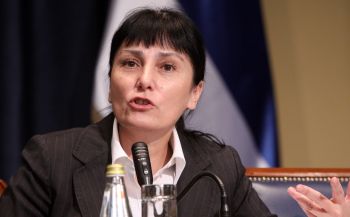- Serbia
Get to know Serbia
- Citizens
Culture and science
Health services
Pension and disability insurance
- Business
Employment
Economy
- Media
- Government
- Contact
Keep in touch
Contact form
Back
Keepin touch
Whether you have a question, comment, suggestion or any problem in the purview of the government, send us your message and we will try to respond as soon as possible. If your problem is not in our purview, we will forward your message to the relevant institution.
Q:
A:
Bill on 2010 budget revision supports most vulnerable categories of society
Belgrade,
18 November 2010
Minister of Finance Diana Dragutinovic said that the Bill on amendments to the Law on the 2010 budget, adopted by the Serbian government today, supports the most vulnerable categories of society.
Dragutinovic told a press conference held after the session that this Bill supports those who are in the greatest need of help – pensioners, employees with low salaries, social help beneficiaries, and it also envisages subsidies to the real sector.
By doing this, the Serbian government wants to create a balance between social cohesion and encouragement of the economy.
She specified that the revised budget envisages a RSD 120 billion deficit, which is RSD 13 billion more than originally planned by the Law on the 2010 budget.
In addition, the revised budget envisages budgetary revenues in the amount of RSD 660 billion, which is RSD 3.5 billion more than originally planned, and RSD 780 billion expenditure, which is RSD 16.5 billion more than originally planned, the Minister outlined.
Most funds will go to the Ministry of Labour and Social Policy, Dragutinovic confirmed and itemised that RSD 3.5 billion will be set aside for social protection.
The revision envisages more funds for education – RSD 892 million, and for the Ministry of the Interior, around RSD 1 billion, she stated and elaborated that this money will not be used to increase salaries, but to pay bonuses to police officers for extra work they had in the previous period.
Also, RSD 2.1 billion was set aside for subsidies to the economy and RSD 650 million for agriculture in order to secure a regular supply of milk.
RSD 3 billion is intended for regulating the debt of heating plants to suppliers of energy, Dragutinovic clarified, adding that poor municipalities in Serbia will get RSD 1 billion through transfer from the budget.
The Minister of Finance stressed that the greatest savings were achieved at the Ministry of Finance and the Ministry for the National Investment Plan, and on the account of costs of interest paid by the state.
She noted that the basic presumption for the revision is the fact that the crisis is behind us, however uncertainty is still high because Serbia is a small economy, dependent on the pace of recovery of other countries in the region and the EU.
Dragutinovic affirmed that the funds for financing the deficit have been secured in their entirety. Dragutinovic underlined that talks with the IMF on the 2011 budget are drawing to a close, voicing her expectation that a final agreement will be reached within several days.
She explained that according to this agreement, the budget deficit should stand at 4% of GDP, the consolidated deficit at state level should be around RSD 140 billion and the deficit of the Serbian budget for 2011 around RSD 125 billion.
The Minister highlighted that the state’s fiscal policy by September 2010 (third quarter) was fully harmonised with the agreement reached with the IMF, adding that by that time the allowed deficit was RSD 110 billion, but it was in fact lower and stood at RSD 85 billion.
By doing this, the Serbian government wants to create a balance between social cohesion and encouragement of the economy.
She specified that the revised budget envisages a RSD 120 billion deficit, which is RSD 13 billion more than originally planned by the Law on the 2010 budget.
In addition, the revised budget envisages budgetary revenues in the amount of RSD 660 billion, which is RSD 3.5 billion more than originally planned, and RSD 780 billion expenditure, which is RSD 16.5 billion more than originally planned, the Minister outlined.
Most funds will go to the Ministry of Labour and Social Policy, Dragutinovic confirmed and itemised that RSD 3.5 billion will be set aside for social protection.
The revision envisages more funds for education – RSD 892 million, and for the Ministry of the Interior, around RSD 1 billion, she stated and elaborated that this money will not be used to increase salaries, but to pay bonuses to police officers for extra work they had in the previous period.
Also, RSD 2.1 billion was set aside for subsidies to the economy and RSD 650 million for agriculture in order to secure a regular supply of milk.
RSD 3 billion is intended for regulating the debt of heating plants to suppliers of energy, Dragutinovic clarified, adding that poor municipalities in Serbia will get RSD 1 billion through transfer from the budget.
The Minister of Finance stressed that the greatest savings were achieved at the Ministry of Finance and the Ministry for the National Investment Plan, and on the account of costs of interest paid by the state.
She noted that the basic presumption for the revision is the fact that the crisis is behind us, however uncertainty is still high because Serbia is a small economy, dependent on the pace of recovery of other countries in the region and the EU.
Dragutinovic affirmed that the funds for financing the deficit have been secured in their entirety. Dragutinovic underlined that talks with the IMF on the 2011 budget are drawing to a close, voicing her expectation that a final agreement will be reached within several days.
She explained that according to this agreement, the budget deficit should stand at 4% of GDP, the consolidated deficit at state level should be around RSD 140 billion and the deficit of the Serbian budget for 2011 around RSD 125 billion.
The Minister highlighted that the state’s fiscal policy by September 2010 (third quarter) was fully harmonised with the agreement reached with the IMF, adding that by that time the allowed deficit was RSD 110 billion, but it was in fact lower and stood at RSD 85 billion.
-
 Belgrade, 22 January 2025
Belgrade, 22 January 2025Egypt one of Serbia’s closest partners on international stage
-
 Belgrade, 9 July 2024
Belgrade, 9 July 2024Support for 104 associations in diaspora that preserve Serbian language, culture
-
 Belgrade, 15 April 2024
Belgrade, 15 April 2024Competition for StarTech grants open until 31 May
-
 Belgrade, 2 October 2023
Belgrade, 2 October 2023Serbia respects Resolution 1244 and will do everything to preserve peace
-
 Belgrade, 13 September 2023
Belgrade, 13 September 2023Day of Serbian Unity to be celebrated outside borders of Serbia, Republika Srpska for the first time
-
 Belgrade, 8 August 2023
Belgrade, 8 August 2023RSD 24.2m in state aid paid out to citizens affected by storm
-
 Belgrade, 17 June 2023
Belgrade, 17 June 2023Belgrade is doing everything to preserve peace in Kosovo and Metohija
-
 Belgrade, 15 June 2023
Belgrade, 15 June 2023Slovenia will continue to support Serbia on its way to EU
-
 Belgrade, 5 May 2023
Belgrade, 5 May 2023Emergency measures, tightening of conditions for possessing weapons
-
 Belgrade, 3 May 2023
Belgrade, 3 May 2023Three days of mourning in Serbia over tragedy at Vladislav Ribnikar primary school


